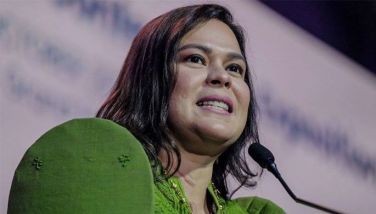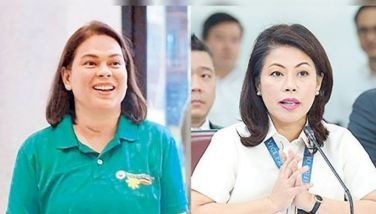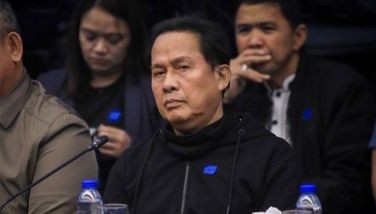War veterans, AFP retirees expected to waive benefits
July 19, 2006 | 12:00am
Veterans of World War II, the Korean war and Vietnam war as well as retirees of the Armed Forces over the age of 70 are likely to waive a bulk of some P20 billion in benefits.
These benefits were provided for by a law passed in 1994 but have never received congressional appropriations and funds for proper implementation.
The waiver, if realized, would significantly reduce the national debt, said former Veterans party-list Rep. Eduardo Pilapil and Presidential Assistant for Veterans’ Affairs Jesus Terry Adevoso.
"This will once again show how much our veterans and retirees love their country and are willing to deeply sacrifice their personal gain for its development and growth," Pilapil and Adevoso said in a statement.
The two leaders of several organizations of veterans’ descendants said their talks with several major veterans’ organizations revealed that veterans appear receptive to the prospect of bringing complete closure to the issue of pension and benefit arrears that has hounded the administrations of past presidents since 1990.
Republic Act 7696, which was passed by Congress without appropriation and with a "subject to availability of funds" clause, provided for a "bonus" of P2,220 monthly to veterans and their spouses in the form of administrative disability pensions.
Adevoso said that this "bonus" pension provided is not for any actual disability suffered and is not service-connected. He said this merely considers the veteran and his spouse as immediately "disabled" upon reaching the age of 70 even if they are still in the pink of health or still able to move around and be productive.
Adevoso said that because RA 7696 never received congressional funds, "it has merely become a propaganda or feel-good (law) that has no actual bite."
Pilapil said that during the three years of his term as party-list representative, Congress consistently failed and refused to provide funds for this "bonus" law, considering that so many other marginalized sectors of society also suffered funding inadequacies and also deserved their rightful share of funds from national government coffers.
He said this thinking of legislators has been persistently present for the last 12 years, resulting in a national government debt that has bloated to its current P20 billion. He said this accounts for 49 percent of the total P41 billion in pension arrears owed by the national government to war veterans and military retirees.
Adevoso pointed out that President Arroyo, for her part, wants to reduce this indebtedness to veterans, as he cited her recent release of P1 billion for partial payment of other arrears in mandated benefits to veterans.
However, he concluded that with the current and expected additional annual inadequacies in veterans benefits funds appropriated by Congress, the prospect of reducing the debt to veterans quickly if done exclusively through presidential fund releases is dim and this is recognized by the country’s financial managers and by the veterans themselves.
These benefits were provided for by a law passed in 1994 but have never received congressional appropriations and funds for proper implementation.
The waiver, if realized, would significantly reduce the national debt, said former Veterans party-list Rep. Eduardo Pilapil and Presidential Assistant for Veterans’ Affairs Jesus Terry Adevoso.
"This will once again show how much our veterans and retirees love their country and are willing to deeply sacrifice their personal gain for its development and growth," Pilapil and Adevoso said in a statement.
The two leaders of several organizations of veterans’ descendants said their talks with several major veterans’ organizations revealed that veterans appear receptive to the prospect of bringing complete closure to the issue of pension and benefit arrears that has hounded the administrations of past presidents since 1990.
Republic Act 7696, which was passed by Congress without appropriation and with a "subject to availability of funds" clause, provided for a "bonus" of P2,220 monthly to veterans and their spouses in the form of administrative disability pensions.
Adevoso said that this "bonus" pension provided is not for any actual disability suffered and is not service-connected. He said this merely considers the veteran and his spouse as immediately "disabled" upon reaching the age of 70 even if they are still in the pink of health or still able to move around and be productive.
Adevoso said that because RA 7696 never received congressional funds, "it has merely become a propaganda or feel-good (law) that has no actual bite."
Pilapil said that during the three years of his term as party-list representative, Congress consistently failed and refused to provide funds for this "bonus" law, considering that so many other marginalized sectors of society also suffered funding inadequacies and also deserved their rightful share of funds from national government coffers.
He said this thinking of legislators has been persistently present for the last 12 years, resulting in a national government debt that has bloated to its current P20 billion. He said this accounts for 49 percent of the total P41 billion in pension arrears owed by the national government to war veterans and military retirees.
Adevoso pointed out that President Arroyo, for her part, wants to reduce this indebtedness to veterans, as he cited her recent release of P1 billion for partial payment of other arrears in mandated benefits to veterans.
However, he concluded that with the current and expected additional annual inadequacies in veterans benefits funds appropriated by Congress, the prospect of reducing the debt to veterans quickly if done exclusively through presidential fund releases is dim and this is recognized by the country’s financial managers and by the veterans themselves.
BrandSpace Articles
<
>
- Latest
- Trending
Trending
Latest
Trending
Latest
Recommended





























